|
|
|
|
|
|
|
|
There will be no update tomorrow- happy New Year! The next update will be Monday.
Today's Congressional Action:
The House and Senate are not in session.
|
Russian Icebreaker Makes Record Setting Arctic Voyage. According to the Russian media outlet Port News, a Russian icebreaker has just completed the fastest transit of the Northern Sea Route. Along with setting the speed record, the icebreaker also completed the trip over a month after the shipping season usually ends in the Arctic. But it's still a long ways off from becoming the next great trade route. Alaska Public Radio
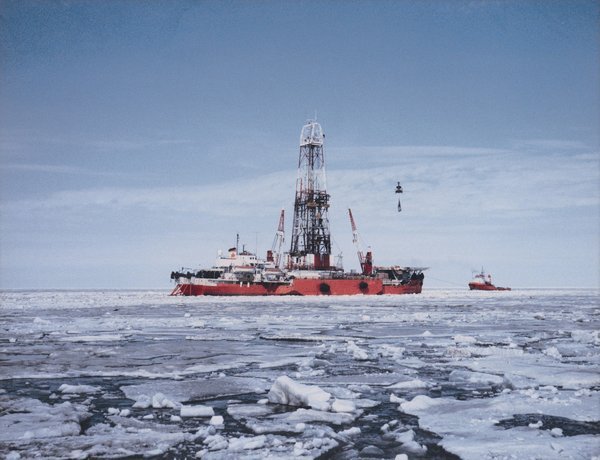 Arctic Oil and Gas: Triumph and Disappoint in 2015. Arctic Oil and Gas: Triumph and Disappoint in 2015. 2015 was a year of both triumph and disappointment for the Arctic's oil and gas industry. While some projects were abandoned, the region's potential was highlighted, and the action continues into 2016. Russia's year in the Arctic saw a range of developments. Most recently, Sovcomflot gained finance for three Arctic shuttle tankers for the Novy Port project. Novy Port is one of the largest oil and gas condensate deposits on the Yamal peninsula in Russia. The vessels will serve as part of project infrastructure designed to enable year-round shipment of crude oil from an offshore loading terminal in the Gulf of Ob. The commercial production from the field will start in 2016. Maritime Executive
The World's First Ice-Busting Yachts Open the High Arctic. The world's billionaires are en route to Canada's High Arctic-and judging by their luxurious, ice-busting rides, Ottawa may have trouble keeping up. In yet another example of how the once-foreboding Northwest Passage has landed on the itineraries of well-heeled global tourists, Dutch shipbuilder Damen wowed the Monaco Yacht Show's attendees this fall when it unveiled its latest luxury toy: the world's first polar-capable super-yacht. Called SeaXplorer, the "purpose-built luxury expedition yacht" boasts a double-acting hull that, when piloted in reverse, can crunch its way through nearly a metre of first-year sea ice. Other handy tools for venturing into the frigid Arctic include, on the biggest version: a pair of helicopters, two submersibles, several launch boats and a heated outdoor bar surface-so your highball doesn't turn into a Popsicle under the midnight sun. Macleans
Polar Wildlife Under Threat as Ice Melts and Makes Seas Brighter. AND then there was light. As ice disappears from the Arctic, the waters below are changing - in ways that until now have mostly been overlooked. Light, once blocked by thick ice, is now penetrating deeper than ever before - and it will have a huge impact on Arctic ecosystems. The effect of warming on ice and sea level have been studied extensively. Until now, the effect of light on the Arctic had not been explored. But its effect is likely to be significant on creatures adapted to unique temperature and light conditions around the poles. "We tend to think of climate warming as something related to temperature, but what is truly unique to polar regions is the light," says Jørgen Berge of the Arctic University of Norway. New Scientist
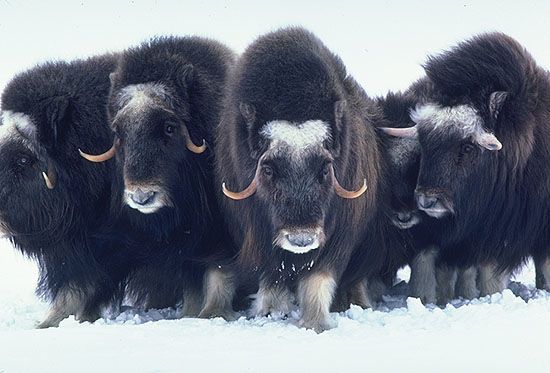 Northern Reindeer, Muskoxen, Caribou Feel Effects of Climate Change. Northern Reindeer, Muskoxen, Caribou Feel Effects of Climate Change. A brisk, refreshing breeze blows over the hills and through the pasture at the University of Calgary's Wildlife Research Station at the Spyhill Campus. Dotting the horizon are eight not-so-tiny reindeer. Like an early dose of holiday magic, the sight transports you to the frozen North. But while these animals are a treat to look at, there's more than meets the eye. Underneath all of the fur and velvety antlers lives a parasitic clue that tells researchers Susan Kutz and Pratap Kafle how well the animals are adapting to climate change. Arctic Journal
|
Legislative Action
No Arctic legislation was formally considered yesterday.
|
|
Future Events
"Arctic Matters" day at the National Academy of Sciences, January 14th, 2016 (Washington, DC, USA)This symposium is part of an ongoing initiative of the National Academies of Science Polar Research Board to expand public understanding of why the dramatic changes affecting the Arctic region ultimately matter to us all. The agenda features engaging presentations and discussions with top Arctic science and policy experts, and displays and interactive exhibits that illustrate Arctic change and its global impacts. The event is free and open to the public. There are sponsorship opportunities, and a call for exhibitor applications. Audience space is limited, so register today; and please encourage your friends, neighbors, and colleagues to participate-as our goal is to reach well beyond the small circle of specialists who typically attend Arctic-themed events in the DC area.
The U.S. Arctic Research Commission is the primary sponsor of this event.
** New this week** ARCUS Arctic Research Seminar Series: Dr. Julie Brigham-Grette, January 15, 2016 (Washington, DC, USA and Webinar).The ARCUS Arctic Research Seminar Series brings some of the leading Arctic researchers to Washington, D.C. to share the latest findings and what they mean for decision-making. The seminars are open, and will be of interest to Federal agency officials, Congressional staff, NGOs, associations, and the public. The inaugural seminar (Friday, 15 January at 12:00 - 1:00 p.m. Eastern Time) will be presented by Dr. Julie Brigham-Grette, Geosciences Professor at the University of Massachusetts, and Chair of the U.S. National Academy of Sciences Polar Research Board.
East-West Arctic Cooperation During Times of Global Tension, January 15, 2016. Can the United States and its allies cooperate with Russia, China and other Asian nations during times of tense relations - or will cooperation on common interests in the Arctic succumb to the more familiar geopolitical tensions of the Cold War era? Stimson will host this event. Vice Admiral Charles Michel, the Vice Commandant of the United States Coast Guard, will deliver a keynote speech on the new Arctic Coast Guard Forum established to promote maritime safety and security cooperation in the Arctic. Following VAdm. Michel's presentation, a panel of experts will discuss the progress and challenges to future East-West cooperation in the Arctic region.
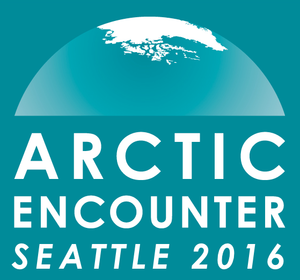 Building upon the preceding Arctic Encounter event in Paris, the third annual Arctic Encounter Symposium (AES) in Seattle, Washington will convene policymakers, industry leaders, and leading experts to confront the leading issues in Arctic policy, innovation, and development. The AES mission is to raise awareness, engage challenges, and develop solutions for the future of a region and a people. The two-day program includes two keynote luncheons, expert plenary sessions, break out sessions, a networking cocktail reception and seated dinner. A closing reception will take place at the conclusion of the program. Building upon the preceding Arctic Encounter event in Paris, the third annual Arctic Encounter Symposium (AES) in Seattle, Washington will convene policymakers, industry leaders, and leading experts to confront the leading issues in Arctic policy, innovation, and development. The AES mission is to raise awareness, engage challenges, and develop solutions for the future of a region and a people. The two-day program includes two keynote luncheons, expert plenary sessions, break out sessions, a networking cocktail reception and seated dinner. A closing reception will take place at the conclusion of the program.
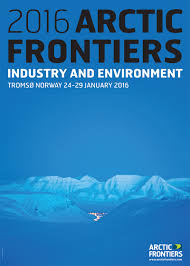 2016 Arctic Frontiers, January 24-29, 2015 (Tromso, Norway).The Arctic is a global crossroad between commercial and environmental interests. The region holds substantial natural resources and many actors are investigating ways to utilise these for economic gain. Others view the Arctic as a particularly pristine and vulnerable environment and highlight the need to limit industrial development. Arctic Frontiers 2016 will discuss the balance between resource utilisation and preservation, and between industrial and environmental interests in the Arctic. Envisioning a well-planned, well-governed, and sustainable development in the Arctic, how can improved Arctic stewardship help balance environmental concerns with industrial expansion? How can the industrial footprints from future business activities be minimised? And last, but not least, what role will existing and emerging technologies play in making industrial development profitable and environmentally friendly, securing a sustainable growth scenario for Arctic communities? 2016 Arctic Frontiers, January 24-29, 2015 (Tromso, Norway).The Arctic is a global crossroad between commercial and environmental interests. The region holds substantial natural resources and many actors are investigating ways to utilise these for economic gain. Others view the Arctic as a particularly pristine and vulnerable environment and highlight the need to limit industrial development. Arctic Frontiers 2016 will discuss the balance between resource utilisation and preservation, and between industrial and environmental interests in the Arctic. Envisioning a well-planned, well-governed, and sustainable development in the Arctic, how can improved Arctic stewardship help balance environmental concerns with industrial expansion? How can the industrial footprints from future business activities be minimised? And last, but not least, what role will existing and emerging technologies play in making industrial development profitable and environmentally friendly, securing a sustainable growth scenario for Arctic communities?
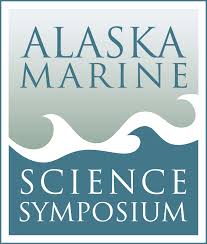
Alaska Forum on the Environment, February 8-12, 2016 (Anchorage, Alaska, USA). The Alaska Forum on the Environment (AFE) is Alaska's largest statewide gathering of environmental professionals from government agencies, non-profit and for-profit businesses, community leaders, Alaskan youth, conservationists, biologists and community elders. The diversity of attendees and comprehensive agenda sets this conference apart from any other. Each year there are over 80 technical breakout sessions and sensational Keynote Events. There will be a full week of sessions on climate change, energy, environmental regulations, cleanup and remediation, fish & wildlife, solid waste, and more.
5th Annual Fletcher Opening Arctic Conference, March 12, 2016. The Opening Arctic Conference builds on the Fletcher School's Warming Arctic International Inquiry series, to bring together high-level thought leaders from across disciplines, Fletcher's hallmark. Staged annually, Fletcher's event continues to address the foreign policy, economic, environmental and security implications of the opening Arctic, while dispelling myths.
Alaska Rural Energy Conference, April 26-28, 2016 (Fairbanks, Alaska, USA). The Alaska Rural Energy Conference is a three day event offering a large variety of technical sessions covering new and ongoing energy projects in Alaska, as well as new technologies and needs for Alaska's remote communities. Building on the growing success, the Alaska Energy Authority and the Alaska Center for Energy and Power have joined forces again to organize and sponsor the 10th annual Alaska Rural Energy Conference.
14th IATS Seminar, June 19-25, 2016 (Bergen, Norway). The University of Bergen (UiB) is honored to host the 14th IATS Seminar in Bergen, Norway, from Sunday 19 to Saturday 25 June 2016 in co-operation with the Network for University Co-operation Tibet-Norway, an academic network with the universities of Oslo, Bergen and Tromsø as partners. The convenor is Professor Hanna Havnevik, Department of Culture Studies and Oriental Languages, University of Oslo, and Chair of the Network.
Inuit traditions are a repository of Inuit culture and a primary expression of Inuit identity. The theme for the 2016 Inuit Studies Conference invites Elders, knowledge-bearers, researchers, artists, policy-makers, students and others to engage in conversations about the many ways in which traditions shape understanding, while registering social and cultural change. The institutional hosts of "Inuit Traditions," Memorial University of Newfoundland and the Nunatsiavut Government, invite you to contribute to an exchange of knowledge to be held in St. John's, Newfoundland and Labrador, October 7-10, 2016. Presentations on all aspects of Inuit studies will be welcome.
|
|

  
4350 N. Fairfax Drive, Suite 510
Arlington, VA 22203, USA
External links in this publication, and on the USARC's World Wide Web site ( www.arctic.gov) do not constitute endorsement by the US Arctic Research Commission of external Web sites or the information, products or services contained therein. For other than authorized activities, the USARC does not exercise any editorial control over the information you may find at these locations. These links are provided consistent with the stated purpose of this newsletter and the USARC Web site.
|
|
|
|
|
|
|
|
|